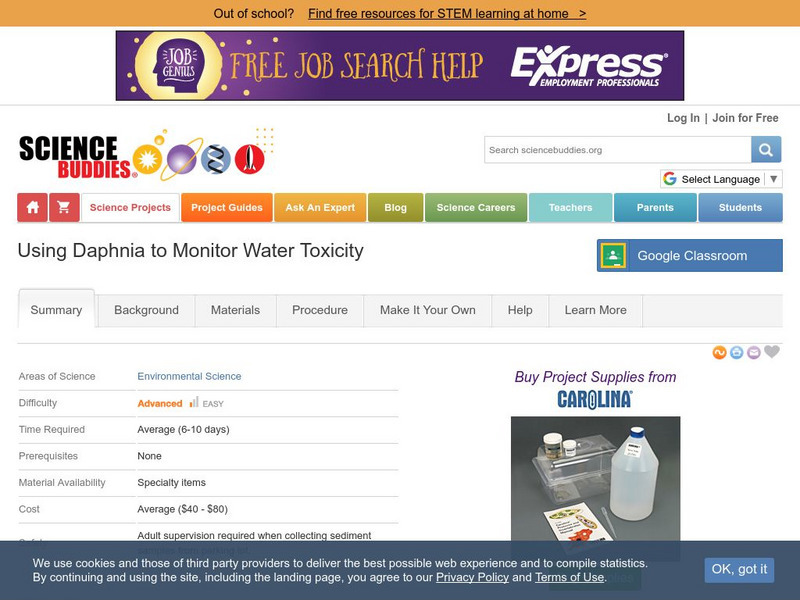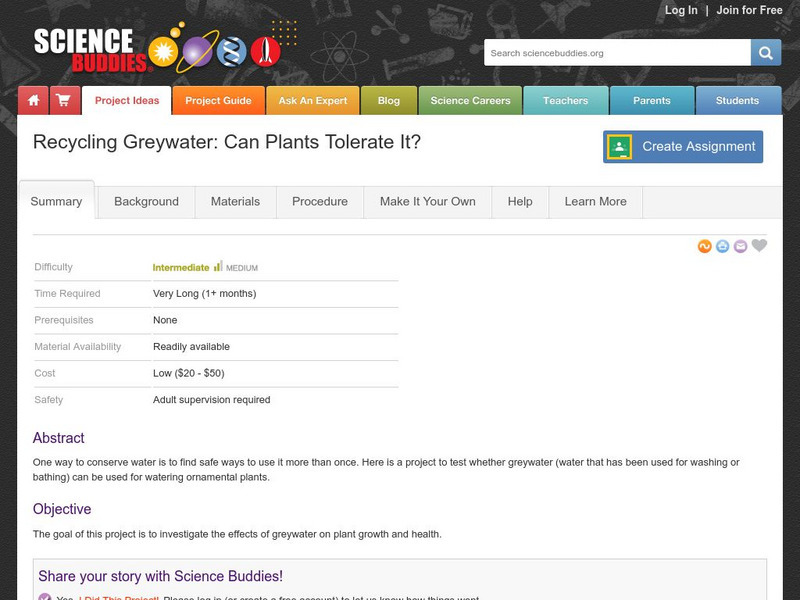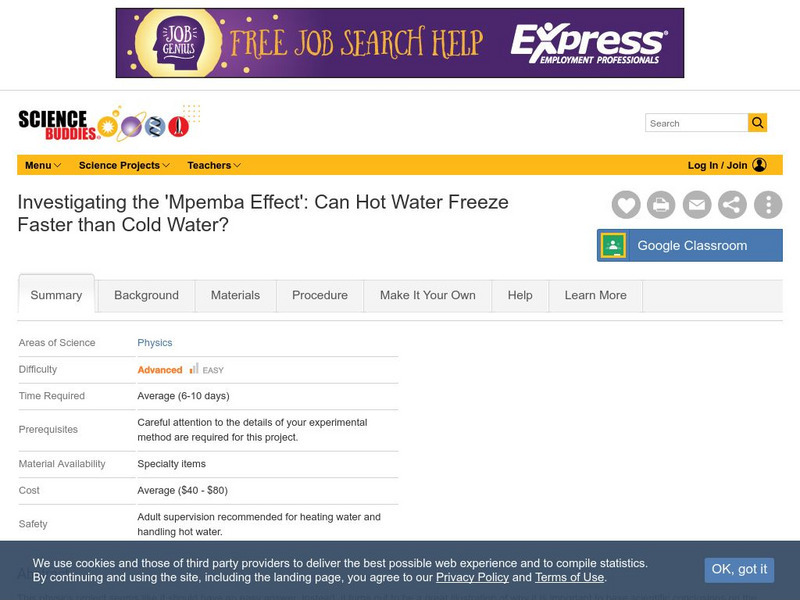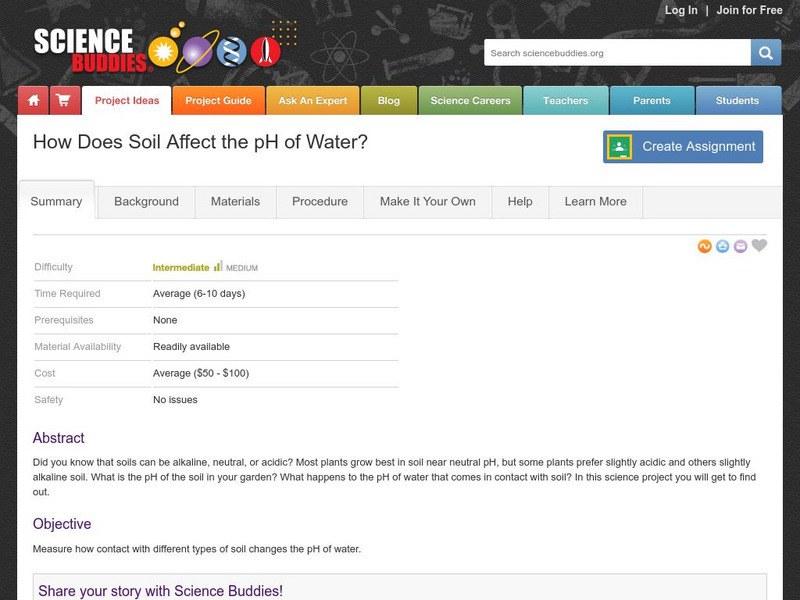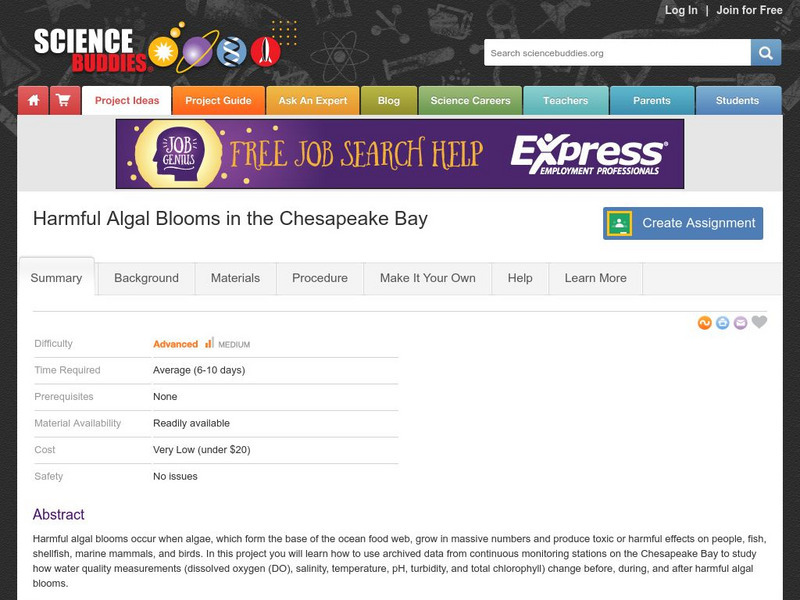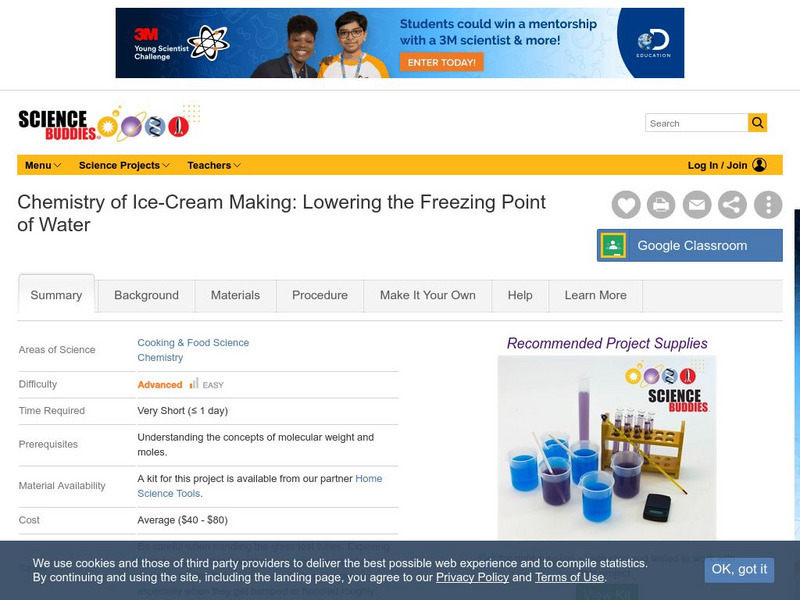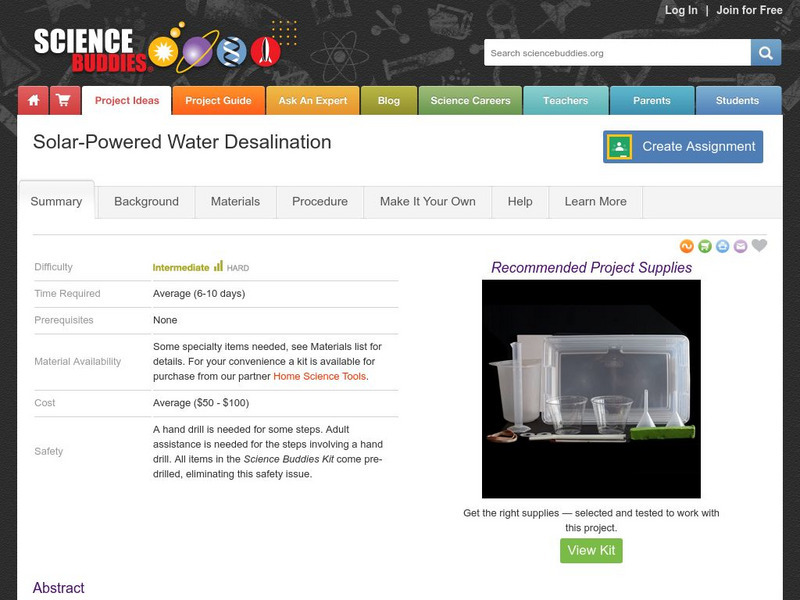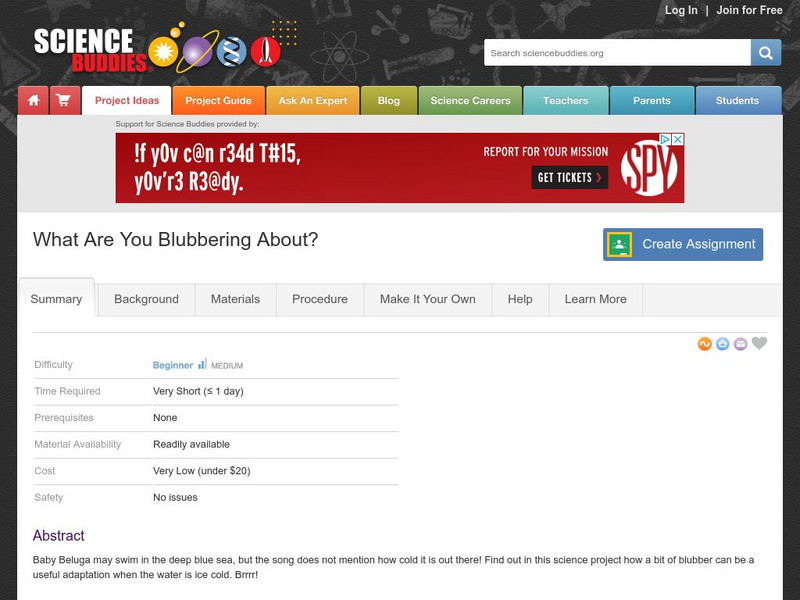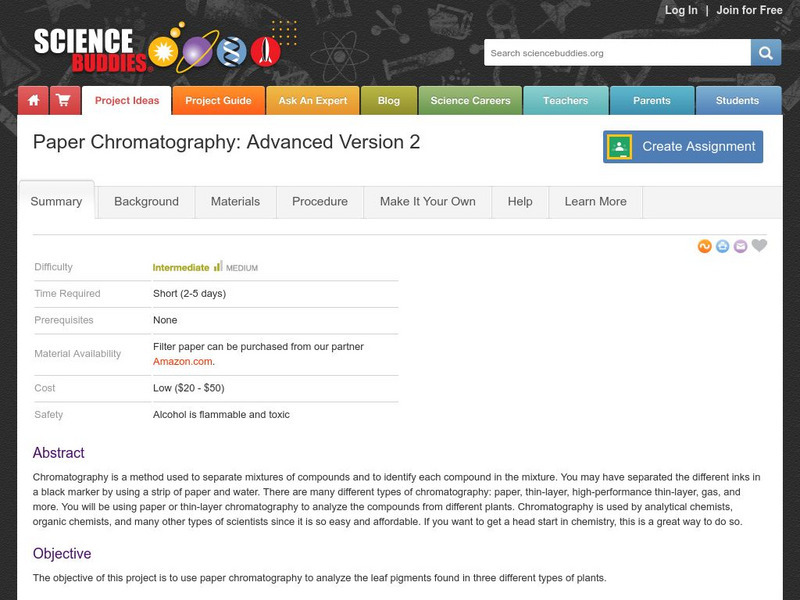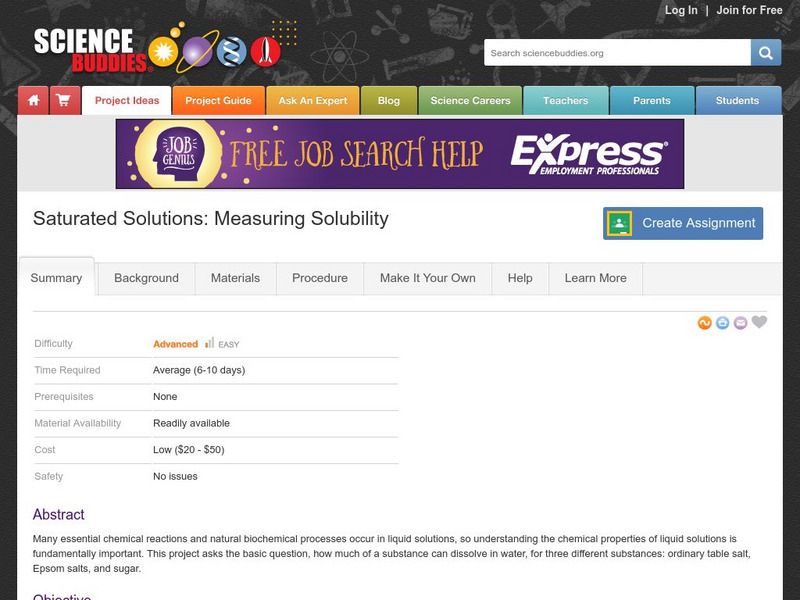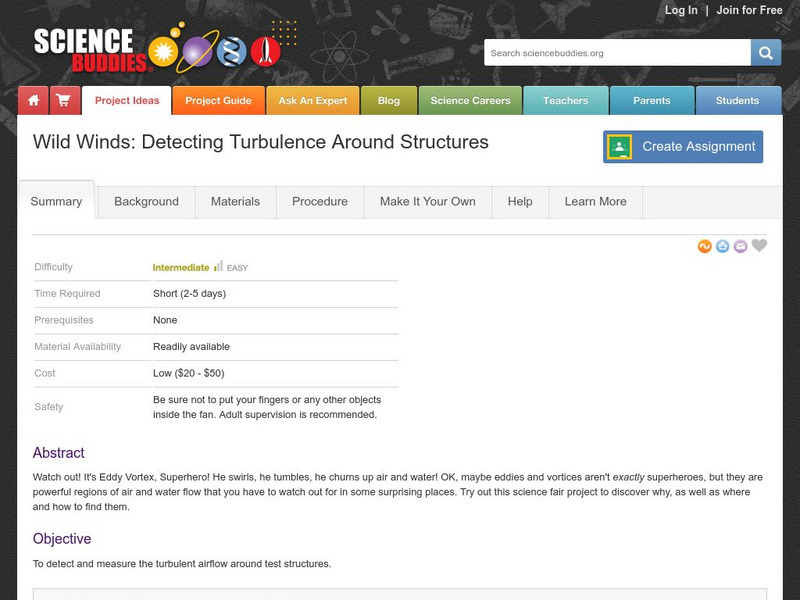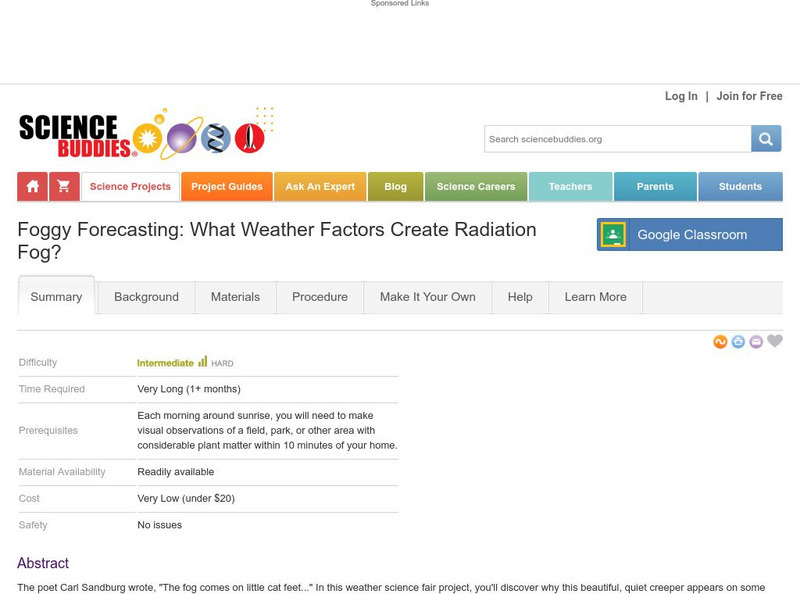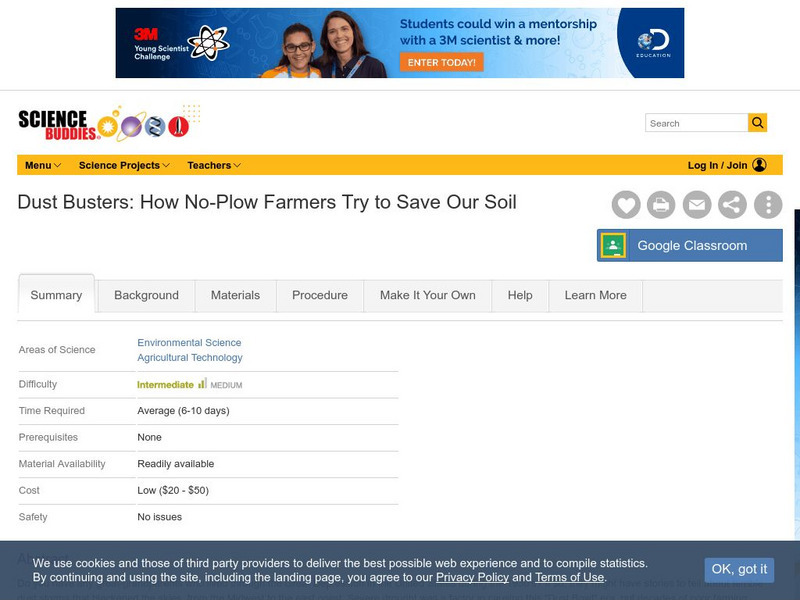Science Buddies
Science Buddies: Project Ideas: How Much Water Is Absorbed by Dried Beans?
In this cooking and food science fair project, measure how the water content of dried beans changes with time. The Science Buddies project ideas are set up consistently beginning with an abstract, objective, and introduction, followed by...
Science Struck
Science Struck: Water Cycle Project Ideas
A collection of ideas for creating a science fair project on the water cycle.
Science Buddies
Science Buddies: How Can Your Faucet Save Water?
Experiment with low-flow faucets and see how much water you can save in your home. The Science Buddies project ideas are set up consistently beginning with an abstract, objective, and introduction, followed by a section on terms,...
Science Buddies
Science Buddies: Using Daphnia to Monitor Water Toxicity
In a bioassay, a living organism serves as a detector for toxins-the same way canaries were used in coal mines to detect invisible toxic gases. In this project, water fleas (Daphnia magna), a freshwater crustacean, are used in a bioassay...
Science Buddies
Science Buddies: Smart Watering: Adjusting Your Sprinklers for Optimal Soil
Use this science fair project to learn how to test your soil to see if it is getting the right amount of water from the sprinklers. Project is set up beginning with an abstract, objective, and introduction, followed by a section on...
Science Buddies
Science Buddies: Underground Water Flow and Darcy's Law
This project shows you how to build a simple model system to simulate underground water flow. Underground water flow is important for understanding replenishment of underground aquifers, migration of underground contaminant plumes, and...
Science Buddies
Science Buddies: Recycling Greywater: Can Plants Tolerate It?
Water is a valuable resource many often take for granted. This exercise however gives you the opportunity to learn about and discover how greywater (water that has been used for washing or bathing) can be used for watering ornamental...
Science Buddies
Science Buddies: Investigate Mpemba Effect Can Hot Water Freeze Faster Than Cold
This physics project seems like it should have an easy answer. Instead, it turns out to be a great illustration of why it is important to base scientific conclusions on the outcome of controlled experiments. Things don't always turn out...
Science Buddies
Science Buddies: How Does Soil Affect the P H of Water?
Did you know that soils can be alkaline, neutral, or acidic? Most plants grow best in soil near neutral pH, but some plants prefer slightly acidic and others slightly alkaline soil. What is the pH of the soil in your garden? What happens...
Science Buddies
Science Buddies: Harmful Algal Blooms in the Chesapeake Bay
Harmful algal blooms occur when algae, which form the base of the ocean food web, grow in massive numbers and produce toxic or harmful effects on people, fish, shellfish, marine mammals, and birds. In this project you will learn how to...
Science Buddies
Science Buddies: Lowering the Freezing Point of Water
When it comes to making ice cream, in order to make the mixture cold enough to freeze, you surround the container with ice and rock salt. This experiment helps you learn how the addition of salt (or other substances) affects the freezing...
Science Buddies
Science Buddies: It's Raining, It's Pouring: Chemical Analysis of Rainwater
Here is an interesting project that could be approached from several different scientific angles: Environmental Science, Weather & Atmosphere, Chemistry, or Plant Biology. You can probably think of your own variations to emphasize...
Science Buddies
Science Buddies: How Much Weight Can Your Boat Float?
Have you ever wondered how a ship made of steel can float? In this project you'll investigate how much weight boat hulls of various shapes and sizes can support without sinking.
Science Buddies
Science Buddies: Solar Powered Water Desalination
Here is a cool project about making fresh water from salt water using solar power, also known as water desalination. The apparatus is made from readily available materials, and the power source is free. As an inventive thinker, you will...
Science Buddies
Science Buddies: Do Warmer Seas Make Stronger Hurricanes?
We've all heard that hurricanes draw their immense power from warm ocean waters. Of course, many factors contribute to the formation and growth of a hurricane, but can we expect to find that the warmer the water, the stronger the...
Science Buddies
Science Buddies: Timing the Tides
Have you ever been to a tide pool during low tide? Some intertidal animals in the low tide zone are left in a tiny pool of water when the tides go out. Other intertidal animals that live in high tide zones may be left to dry out during...
Science Buddies
Science Buddies: Caffeine and Heart Rate: A Pharmacological Study Using Daphnia
In this project, water fleas (Daphnia magna), a semi-transparent freshwater crustacean, are used to study the effects of caffeine on heart rate. You do not have to learn how to take a crustacean's pulse though, because you can actually...
Science Buddies
Science Buddies: What Are You Blubbering About?
Baby Beluga may swim in the deep blue sea, but the song doesn't mention how cold it is out there. Find out in this short project how a bit of blubber can be a useful adaptation when the water is ice cold.
Science Buddies
Science Buddies: Paper Chromatography: Advanced Version 2
Chromatography is a method used to separate mixtures of compounds and to identify each compound in the mixture. You may have separated the different inks in a black marker by using a strip of paper and water. There are many different...
Science Buddies
Science Buddies: How Does Color Affect Heating by Absorption of Light?
Light is an example of an electromagnetic wave. Electromagnetic waves can travel through the vacuum of interstellar space. They do not depend on an external medium-unlike a mechanical wave such as a sound wave which must travel through...
Science Buddies
Science Buddies: Saturated Solutions: Measuring Solubility
Many essential chemical reactions and natural biochemical processes occur in liquid solutions, so understanding the chemical properties of liquid solutions is fundamentally important. This project will challenge you to discover how much...
Science Buddies
Science Buddies: Wild Winds: Detecting Turbulence Around Structures
Watch out. It's Eddy Vortex, Superhero. He swirls, he tumbles, he churns up air and water. OK, maybe eddies and vortices aren't exactly superheroes, but they are powerful regions of air and water flow that you have to watch out for in...
Science Buddies
Science Buddies: Foggy Forecasting: What Weather Factors Create Radiation Fog?
The poet Carl Sandburg wrote, "The fog comes on little cat feet". In this weather science fair project, you'll discover why this beautiful, quiet creeper appears on some days, and not on others. If you are fascinated by fog and weather...
Science Buddies
Science Buddies: Dust Busters: How No Plow Farmers Try to Save Our Soil
In this environmental science fair project, students will build models of fields prepared by plow-based and no-till methods, and see which ones are best at retaining soil moisture and preventing surface runoff.



